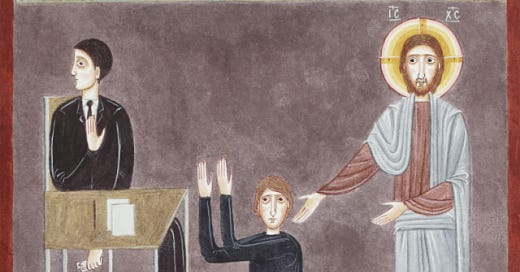The lectionary Gospel for Sunday is from Matthew 18.21-35, the troublesome text in which Peter presses the Lord about mercy’s boundary.
When Peter asks Jesus if forgiving someone seven times is sufficient, Peter must’ve thought it was a good answer. Peter’s a hand-raiser and a butt-kisser. Peter wouldn’t have volunteered if he thought it was the wrong answer.
After all, the Jewish Law commanded God’s people to forgive a wrongdoer three times. Seven times no doubt struck Peter as a generous, Jesusy amount of forgiveness. Not only does Peter double the amount of forgiveness prescribed by the Law, he adds one, rounding the total to seven. Because God had spoken creation into being in seven days, the number seven was the Jewish number for completeness and perfection.
Peter might be an idiot, but he’s not stupid.
Peter knew seven times— that’s a divine amount of forgiveness.
Think about it— seven times:
Imagine someone sins against you. Say, a church member gossips about you behind your back. I’m not suggesting anyone in your church would do that, just take it as a for instance.
Imagine someone gossips about you.
And you confront them about it.
1. And they say: ‘I’m sorry.’ So you say to them: ‘I forgive you.’
2. And then they do it again. And you forgive them.
3. And then they do it again. And you forgive them.
4. And then they do it again. And you forgive them.
5. And then they do it again. And you forgive them.
6. And then they do it again for sixth time. And you forgive them.
I mean...fool me once shame on you. Fool me 2,3,4,5,6 times...how many times does it take until its shame on me?
It’s got to stop somewhere, right?
“What’s the limit, Jesus? Where’s the boundary?”
And remember, Matthew 18 is all one scene. It’s Jesus’ yarn about the Good Shepherd, who all but abandons the well-behaved ninety-nine to search out the single sheep too stupid to stay with the flock, that prompts Peter’s question and the parable that answers Peter’s question.
How many times should the lost sheep be sought and brought back, Jesus?
How many fatted calves does the father have to slaughter for his kid?
How many times do we have to forgive, Jesus?
And Peter suggests drawing the line at seven times. Whether we’re talking about gossip or anger or adultery or synagogue shooters, seven is a whole lot of forgiveness. Probably Peter expected a pat on the back and a gold star from Jesus. But he doesn’t get one.
Notice what Jesus doesn’t do with Peter’s question.
Notice— Jesus doesn’t respond to Peter’s question with another question. Jesus doesn’t ask Peter “What’d they do?” Jesus doesn’t say “Well, you know, it depends— the forgiveness has to fit the crime.”
No, Jesus takes it in the other direction: “Not seven times, but, seventy-seven times.”
Seventy-seven times— pay attention, now, this is important.
Jesus didn’t pull that number out of his incarnate keister.
By telling Peter seventy-seven times forgiveness for those who sin against you, Jesus hearkens back to the mark of Cain and the sin of all of us in Adam.
In Genesis 4, after Cain murders his brother Abel, in order to prevent a cyle of bloodshed, God— in God’s mercy— places a mark on Cain, and God warns humanity that whoever harms Cain will suffer a sevenfold vengeance. They will receive seven times vengeance, God warns.
Later in Genesis 4, after civilization is founded east of Eden on the blood of Abel, Lamech, Cain’s grandson, murders a man. And in telling his two wives about the murder, Lamech plagiarizes God’s promise for himself and Lamech declares that if anyone should harm Lamech then vengeance will be visited upon them— guess how many times— seventy times.
If you don’t get this, you won’t get it.
When Jesus tells Peter he owes another seventy-seven times forgiveness, Jesus is not fixing a boundary, albeit a gracious and superabundant boundary.
No, Jesus is saying that in him there is no limit to God’s forgiveness because his is a pardon powerful to unwind all of our sin as far back as Adam’s original sin.
Keep reading with a 7-day free trial
Subscribe to Tamed Cynic to keep reading this post and get 7 days of free access to the full post archives.





